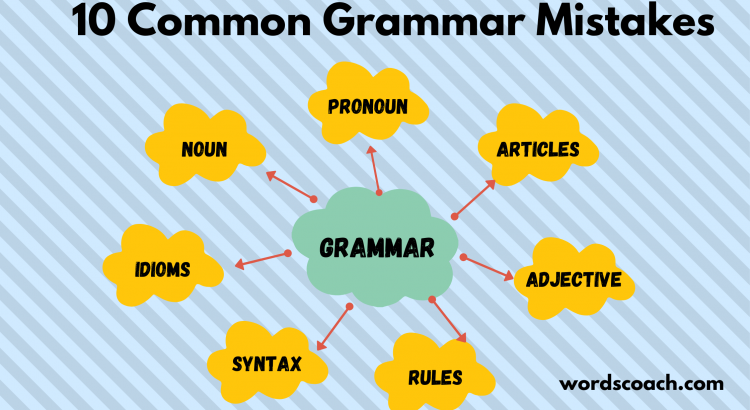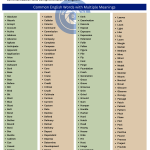10 Basic Grammar Mistakes You Should Avoid
English is the most widely spoken language worldwide. And English grammar is important in every aspect of life. Grammar mistakes are not trivial. It can make your impression from hero to zero. You can lose your credibility at your work if you make grammatical errors consistently. It seems daunting, right? Well, it’s not dreadful if you learn some common mistakes, and using it correctly is incredibly rewarding.
Common Grammar Mistakes Writers Should Avoid
Here, is a list of some common grammar mistakes you should keep in mind to improve your language. It can come in many forms. Let’s dig into it.
10 Grammar Mistakes You Should Avoid
1. Use of the Wrong Tense
Tenses are the pillar of English grammar. We have learned tenses when we were kids. However, still, we sometimes do make mistakes in their usages. Have a look at some of the common errors.
- Using the past tense after did in place of the infinitive without to.
Incorrect: Did you went to the park yesterday?
Correct: Did you go to the park yesterday?
- Utilize the past simple tense after to + the infinitive.
Incorrect: She tried to cooked the pasta.
Correct: She tried to cook the pasta.
- Using the present perfect tense instead of the simple past tense.
Incorrect: I have seen a good movie yesterday.
Correct: I saw a good movie yesterday.
- Using the future tense in the if clause instead of the present tense.
Incorrect: If she’ll ask me, I will stay.
Correct: If she asks me, I will stay.
- Using the past continuous tense for a habitual action, in place of the simple past tense.
Incorrect: Last year I was walking to the office every day.
Correct: Last year I walked to the office every day.
On the off chance that you need to brush up your skills of tenses, at that point refer to our article on tenses.
2. The Omission of the Preposition
In some conditions, we unnecessarily omit prepositions. Let’s see, what are they?
- A person can pay another person. But he/she pay for a thing that he/she buys.
Incorrect: How much did you pay the bag?
Correct: How much did you pay for the bag?
- Listen to a person or a thing, not listen a person or thing.
Incorrect: I was listening the music.
Correct: I was listening to the music.
- Think of a person or thing, not think a person or thing.
Incorrect: Think a number and then add it to 5.
Correct: Think of a number and then add it to 5.
- It should be Ask for a thing, not ask a thing.
Incorrect: She came and asked my pen.
Correct: She came and asked for my pen.
Here, is a list of other words that need to be used with prepositions.
| Dream of |
| Explain to |
| Knock at |
| Reply to |
| Say to |
| Search for |
| Share with |
| Speak to |
3. Wrong Position of Adverbs
Sometimes we misplace the adverb in a sentence. Look at some examples for understanding.
- The adverb misplaced with a transitive verb.
Incorrect: Eric wrote carefully his letter.
Correct: Eric wrote his letter carefully.
With a transitive verb, the adverb normally comes after the object.
- Not misplaced with the negative infinitive.
Incorrect: I told Samantha to not come on Friday.
Correct: I told Samantha not to come on Friday.
Position not in negative infinitive immediately before the word to, and not after it.
- The adverb enough misplaced.
Incorrect: Is the room enough large for you?
Correct: Is the room large enough for you?
You should place the adverb enough after the word it qualifies and not before.
4. Shuffling up spellings
There are many words in English language that sound the same. But they are very different in meaning and spellings. Making mistakes in using them can be humiliating. Let’s have a glimpse of some of them.
“There” vs. “Their”
“To” vs. “Too”
“Fair” vs. “Fare”
“Bear” vs. “Bare”
“Wear” vs. “Where”
“Weather” vs. “Whether”
“You’re” vs. “Your”
For instance,
Incorrect: I wish we had gone their for holidays.
Correct: I wish we had gone there for holidays.
“There” is highlighting toward a place, indicating direction. It also has an abstract function, for figurative places, as well as used in statements of fact, ordinarily in “there are” and “there is” constructs. On the contrary, “Their” is pretty straightforward. It always suggests possession by people or things. All the more explicitly, “their” is a possessive pronoun. It substitutes the noun in a sentence.
Incorrect: Can she come to?
Correct: Can she come too?
Generally, “To” goes about as an adverb or a preposition. As an adverb, “to” shows something is moving toward a wanted position or coming into awareness. “Too”, on the other hand, only goes about as an adverb. It signifies “also” or “in addition.”
5. Apostrophe Errors
- Never use an apostrophe when it comes to a possessive pronoun.
Incorrect: Their’s, Your’s
Correct: Theirs, Yours
- Never use an apostrophe to form a plural.
Incorrect: car’s, taxi’s
Correct: cars, taxis
- Nowadays, the apostrophe is not used for a span of years.
Incorrect: 1970’s
Correct: 1970s
6. Unnecessary Articles
As a rule, nouns in English grammar take no article when used in a general sense, but if they are used in a particular sense the article is needed. Let’s look at some examples.
- Use of the with proper nouns.
Incorrect: Eric will go to the Paris.
Correct: Eric will go to Paris.
- Use of the with abstract nouns.
Incorrect: The bravery is a great virtue.
Correct: Bravery is a great virtue.
- Utilize the in the phrase in future.
Incorrect: You must be careful in the future.
Correct: You must be careful in future.
- Use of the with names of colour.
Incorrect: The blue is my favourite colour.
Correct: Blue is my favourite colour.
7. Confusion in Verbs
Some examples are given below:
- To form the simple future, the use shall with the first person and will with the second and third persons. Will in the first person indicate resolution or personal determination, and shall in the second and third persons denote either a command or a promise.
Incorrect: I will go tomorrow if it’s fine.
Correct: I shall go tomorrow if it’s fine.
- Say and Tell
Incorrect: He told that he’d go home.
Correct: He said that he’d go home.
- Stay and Remain
Incorrect: We remained in a hotel.
Correct: We stayed in a hotel.
- Leave for Let go
Incorrect: Leave the other end of the string.
Correct: Let go of the other end of the string.
8. Errors in using Adjectives
- Many and Much
Use many with plural nouns. And you should use much with uncountable nouns.
Incorrect: My sister hasn’t much books.
Correct: My sister hasn’t many books.
- Few and A Few
Few means not many. And a few which means at least some.
Incorrect: Although the question was easy, a few boys were able to answer it.
Correct: Although the question was easy, few boys were able to answer it.
- Each and Every
Each can be used for one of two or more things, taken one by one. Each is more individual and specific. Whereas every is the more emphatic word.
Incorrect: Each child had an apple.
Correct: Every child had an apple.
9. Excessive Usage of Commas
Commas are significant for clarity and give the reader a chance to pause in the sentence, it’s possible to use commas when you don’t need them. These superfluous commas can be confounding to read, and they make writing look less professional.
Incorrect: The things that cause me bliss, may also cause me pain.
Correct: The things that cause me bliss may also cause me pain.
10. Misplaced Modifiers
A modifier is a word, phrase, or clause that depicts another part of a sentence. A misplaced modifier is a word (or group of words) that does not link clearly to what it is expected to modify. A misplaced modifier creates the meaning of a sentence ambiguous or wrong.
Incorrect: Eric only eats cakes.
Correct: Eric eats only cakes.
Incorrect: Most participants selected a dinner from the menu that was high in sugar.
Correct: Most participants selected a dinnerthat was high in sugar from the menu.
To summarize, it was a list of some of the grammar mistakes you should avoid losing your credibility. At whatever point you’re in doubt about a rule, take a brief moment to look it up. You’ll save yourself some humiliation.
Hope it helps!! Happy Learning
Written by,
Jaini Bhavsar (There’s always room for bliss.)
3rd July 2020
Connect with me on LinkedIn






Excelente